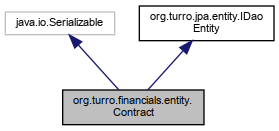

Static Public Member Functions | |
| static void | checkNames () |
Definition at line 40 of file Contract.java.
|
static |
Definition at line 448 of file Contract.java.
| Collection<Collection> org.turro.financials.entity.Contract.collections | ( | ) |
Implements org.turro.jpa.entity.IDaoEntity.
Definition at line 365 of file Contract.java.

| Object org.turro.financials.entity.Contract.entityId | ( | ) |
Implements org.turro.jpa.entity.IDaoEntity.
Definition at line 339 of file Contract.java.
| ContractDefinition org.turro.financials.entity.Contract.getContractDefinition | ( | ) |
Definition at line 125 of file Contract.java.


| Set<Contracted> org.turro.financials.entity.Contract.getContracted | ( | ) |
| Set<ContractFlow> org.turro.financials.entity.Contract.getContractFlows | ( | ) |
| ContractHandshake org.turro.financials.entity.Contract.getContractHandshake | ( | ) |
| String org.turro.financials.entity.Contract.getContractor | ( | ) |
| Set<ContractPreference> org.turro.financials.entity.Contract.getContractPreferences | ( | ) |
| Currency org.turro.financials.entity.Contract.getCurrency | ( | ) |
| Department org.turro.financials.entity.Contract.getDepartment | ( | ) |
| List<Document> org.turro.financials.entity.Contract.getDocuments | ( | ) |
Definition at line 439 of file Contract.java.


| Date org.turro.financials.entity.Contract.getEndDate | ( | ) |
| double org.turro.financials.entity.Contract.getFee | ( | ) |
Definition at line 244 of file Contract.java.
| Collection<ContractFlow> org.turro.financials.entity.Contract.getFlowFor | ( | Document | document | ) |
| String org.turro.financials.entity.Contract.getFullDescription | ( | ) |
Definition at line 391 of file Contract.java.
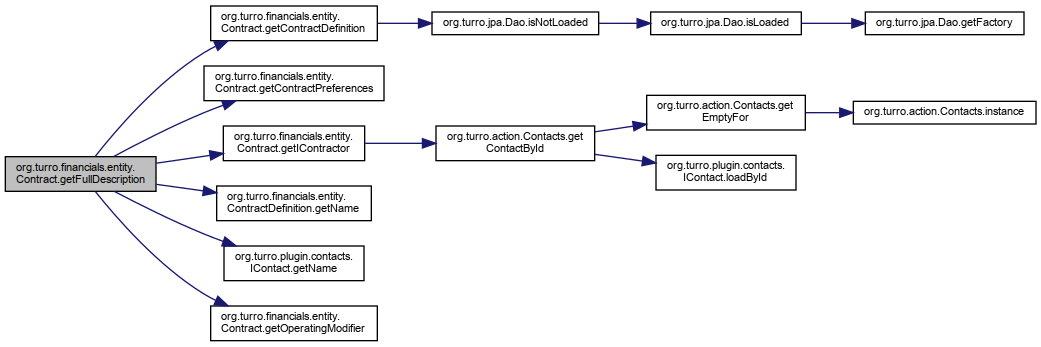

| String org.turro.financials.entity.Contract.getGlobalId | ( | ) |
| String org.turro.financials.entity.Contract.getGrouping | ( | ) |
Definition at line 236 of file Contract.java.
| IContact org.turro.financials.entity.Contract.getIContractor | ( | ) |
Definition at line 376 of file Contract.java.

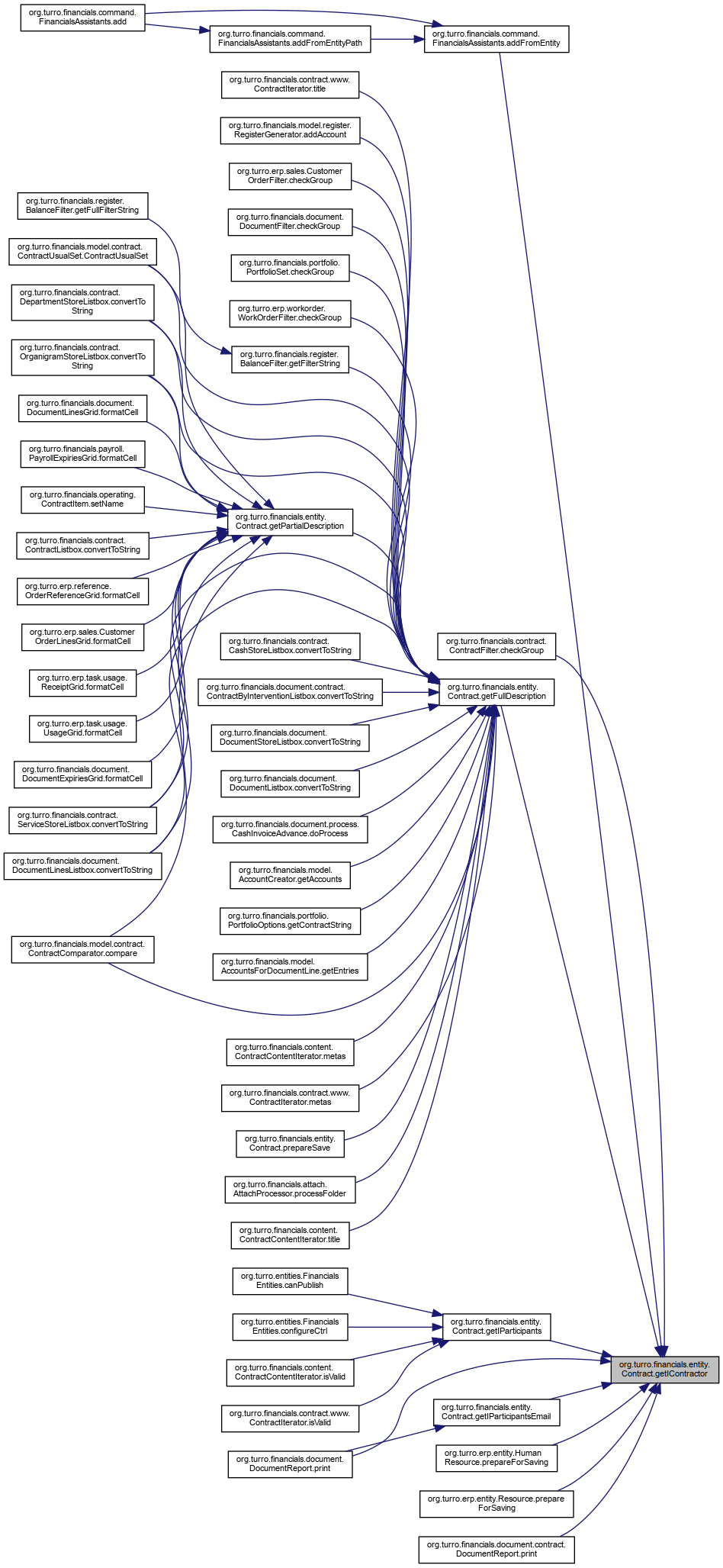
| long org.turro.financials.entity.Contract.getId | ( | ) |
| Collection<IContact> org.turro.financials.entity.Contract.getIParticipants | ( | ) |
Definition at line 462 of file Contract.java.

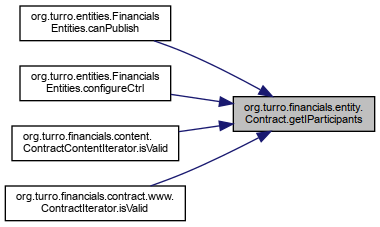
| Collection<IContact> org.turro.financials.entity.Contract.getIParticipantsEmail | ( | ) |
Definition at line 473 of file Contract.java.


| String org.turro.financials.entity.Contract.getName | ( | ) |
| String org.turro.financials.entity.Contract.getNotes | ( | ) |
Definition at line 220 of file Contract.java.
| OperatingModifier org.turro.financials.entity.Contract.getOperatingModifier | ( | ) |
| String org.turro.financials.entity.Contract.getPartialDescription | ( | ) |
Definition at line 383 of file Contract.java.


| Set<ContractParticipant> org.turro.financials.entity.Contract.getParticipants | ( | ) |
| Periodicity org.turro.financials.entity.Contract.getPeriodicity | ( | ) |
Definition at line 252 of file Contract.java.
| Set<RelatedContractStore> org.turro.financials.entity.Contract.getRelatedContractStores | ( | ) |
Definition at line 268 of file Contract.java.

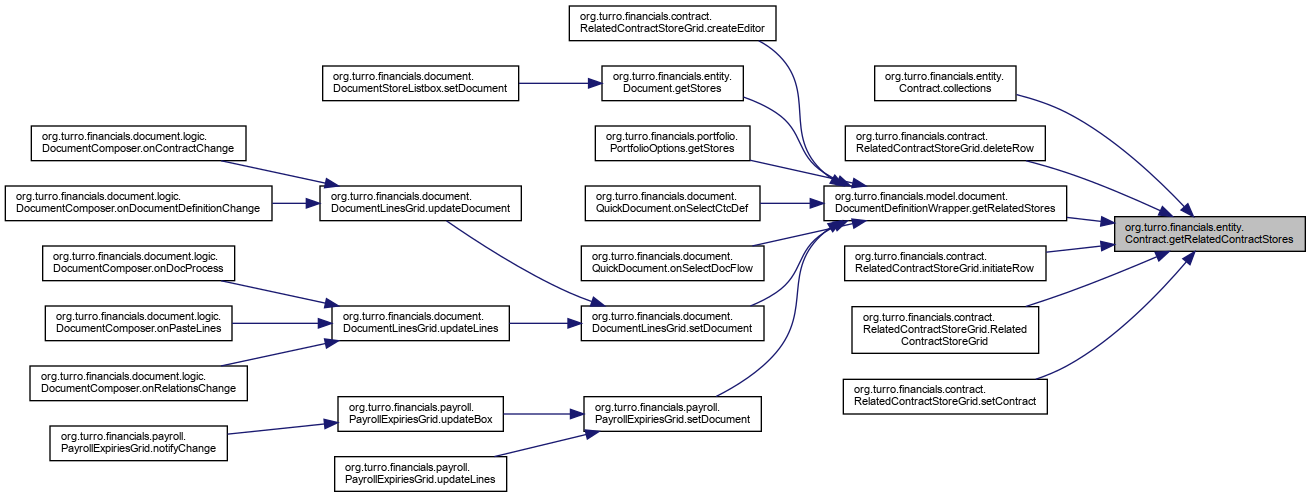
| MappingSet org.turro.financials.entity.Contract.getSerializerMappings | ( | ) |
Definition at line 499 of file Contract.java.
| Service org.turro.financials.entity.Contract.getService | ( | ) |
| Date org.turro.financials.entity.Contract.getStartDate | ( | ) |
| Set<Tax> org.turro.financials.entity.Contract.getTaxes | ( | ) |
| String org.turro.financials.entity.Contract.getUsualPath | ( | DocumentDefinition | documentDefinition | ) |
Definition at line 488 of file Contract.java.


| boolean org.turro.financials.entity.Contract.isActive | ( | ) |
| boolean org.turro.financials.entity.Contract.isCash | ( | ) |
Definition at line 117 of file Contract.java.
| boolean org.turro.financials.entity.Contract.isEmpty | ( | ) |
Implements org.turro.jpa.entity.IDaoEntity.
Definition at line 344 of file Contract.java.


| boolean org.turro.financials.entity.Contract.isEquivalenceSurcharge | ( | ) |
| boolean org.turro.financials.entity.Contract.isStock | ( | ) |
Definition at line 296 of file Contract.java.
| boolean org.turro.financials.entity.Contract.isUseContractorCode | ( | ) |
| void org.turro.financials.entity.Contract.prepareSave | ( | ) |
Implements org.turro.jpa.entity.IDaoEntity.
Definition at line 349 of file Contract.java.
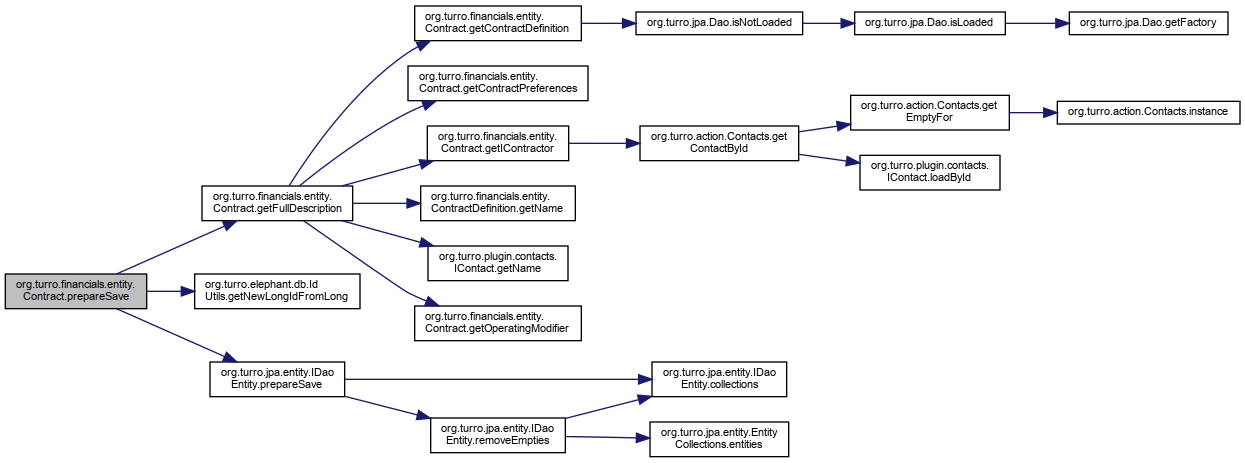
| void org.turro.financials.entity.Contract.setActive | ( | boolean | active | ) |
Definition at line 113 of file Contract.java.
| void org.turro.financials.entity.Contract.setCash | ( | boolean | cash | ) |
Definition at line 121 of file Contract.java.
| void org.turro.financials.entity.Contract.setContractDefinition | ( | ContractDefinition | contractDefinition | ) |
Definition at line 133 of file Contract.java.
| void org.turro.financials.entity.Contract.setContracted | ( | Set< Contracted > | contracted | ) |
Definition at line 316 of file Contract.java.
| void org.turro.financials.entity.Contract.setContractFlows | ( | Set< ContractFlow > | contractFlows | ) |
Definition at line 141 of file Contract.java.
| void org.turro.financials.entity.Contract.setContractHandshake | ( | ContractHandshake | contractHandshake | ) |
| void org.turro.financials.entity.Contract.setContractor | ( | String | contractor | ) |
Definition at line 157 of file Contract.java.
| void org.turro.financials.entity.Contract.setContractPreferences | ( | Set< ContractPreference > | contractPreferences | ) |
Definition at line 149 of file Contract.java.
| void org.turro.financials.entity.Contract.setCurrency | ( | Currency | currency | ) |
Definition at line 168 of file Contract.java.
| void org.turro.financials.entity.Contract.setDepartment | ( | Department | department | ) |
Definition at line 176 of file Contract.java.
| void org.turro.financials.entity.Contract.setEndDate | ( | Date | endDate | ) |
Definition at line 184 of file Contract.java.
| void org.turro.financials.entity.Contract.setEquivalenceSurcharge | ( | boolean | equivalenceSurcharge | ) |
Definition at line 192 of file Contract.java.
| void org.turro.financials.entity.Contract.setFee | ( | double | fee | ) |
Definition at line 248 of file Contract.java.
| void org.turro.financials.entity.Contract.setGlobalId | ( | String | globalId | ) |
Definition at line 200 of file Contract.java.
| void org.turro.financials.entity.Contract.setGrouping | ( | String | grouping | ) |
Definition at line 240 of file Contract.java.
| void org.turro.financials.entity.Contract.setId | ( | long | id | ) |
Definition at line 208 of file Contract.java.
| void org.turro.financials.entity.Contract.setName | ( | String | name | ) |
Definition at line 216 of file Contract.java.
| void org.turro.financials.entity.Contract.setNotes | ( | String | notes | ) |
Definition at line 224 of file Contract.java.
| void org.turro.financials.entity.Contract.setOperatingModifier | ( | OperatingModifier | operatingModifier | ) |
Definition at line 232 of file Contract.java.
| void org.turro.financials.entity.Contract.setParticipants | ( | Set< ContractParticipant > | participants | ) |
Definition at line 264 of file Contract.java.
| void org.turro.financials.entity.Contract.setPeriodicity | ( | Periodicity | periodicity | ) |
Definition at line 256 of file Contract.java.
| void org.turro.financials.entity.Contract.setRelatedContractStores | ( | Set< RelatedContractStore > | relatedContractStores | ) |
Definition at line 276 of file Contract.java.
| void org.turro.financials.entity.Contract.setService | ( | Service | service | ) |
Definition at line 284 of file Contract.java.
| void org.turro.financials.entity.Contract.setStartDate | ( | Date | startDate | ) |
Definition at line 292 of file Contract.java.
| void org.turro.financials.entity.Contract.setStock | ( | boolean | stock | ) |
Definition at line 300 of file Contract.java.
| void org.turro.financials.entity.Contract.setTaxes | ( | Set< Tax > | taxes | ) |
Definition at line 308 of file Contract.java.
| void org.turro.financials.entity.Contract.setUseContractorCode | ( | boolean | useContractorCode | ) |
Definition at line 324 of file Contract.java.